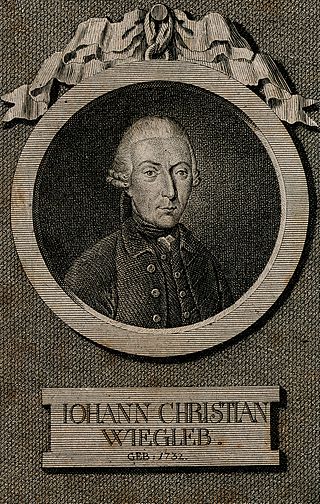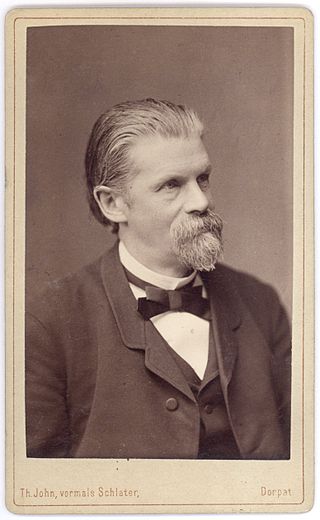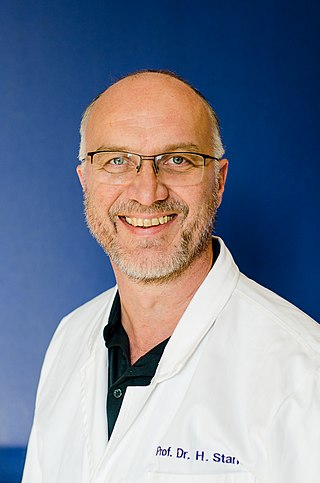Related Research Articles
Carl Ulrich Franz Mannich was a German chemist. From 1927 to 1943 he was professor for pharmaceutical chemistry at the University of Berlin. His areas of expertise were keto bases, alcohol bases, derivatives of piperidine, papaverine, lactones and also Digitalis-glycosides.
A history journal is an academic serial publication designed to present new scholarship on a historical subject, usually a subfield of history, with articles generally being subjected to peer review.

Justus Liebig's Annalen der Chemie was one of the oldest and historically most important journals in the field of organic chemistry worldwide. It was established in 1832 and edited by Justus von Liebig with Friedrich Wöhler and others until Liebig's death in 1873. The journal was originally titled Annalen der Pharmacie; its name was changed to Justus Liebig's Annalen der Chemie in 1874. In its first decades of publishing, the journal was both a periodical containing news of the chemical and pharmaceutical fields and a publisher of primary research. During this time, it was noted to contain rebuttals and criticism of the works it published, inserted by Justus von Liebig during his tenure as an editor. After 1874, changes were made to editorial policies, and the journal published only completed research; later on, in the 20th century, its focus was narrowed to only print articles on organic chemistry, though it had always placed emphasis on the field. The journal was especially influential in the mid-19th century, but by the post-World War II period was considered "no longer as preeminent as it once was".

The Pharmacy Museum of the University of Basel shows in its permanent collection the history of medicinal remedies and their preparation. Designed as a collection of specimens for study purposes, the museum was founded in 1924 by Josef Anton Häfliger (1873–1954) and has been preserved to this day in its original form as a 'scientific cabinet'.

Johann Christian Wiegleb was a notable German apothecary and early innovator of chemistry as a science.

Rudolf Simek is an Austrian philologist and religious studies scholar who is Professor and Chair of Ancient German and Nordic Studies at the University of Bonn. Simek specializes in Germanic studies, and is the author of several notable works on Germanic religion and mythology, Germanic peoples, Vikings, Old Norse literature, and the culture of Medieval Europe.
The American Journal of Pharmaceutical Education is the official publication of the American Association of Colleges of Pharmacy. According to the editors, the journal's purpose is "to document and advance pharmaceutical education in the United States and Internationally."

Johann Georg Noel Dragendorff was a German pharmacist and chemist born in Rostock.

Johann Bartholomew (Bartholomäus) Trommsdorff, was a German chemist and pharmacist noted for his 1805 Systematisches Handbuch der Gesammten Chemie ; a work that was published in eight volumes.
Dietmar Otto Ernst Rothermund was a German historian and professor of the history of South Asia at the Ruprecht-Karls University in Heidelberg. He is considered an important representative of modern German historical scholarship. Although he began his academic career as an Americanist, he eventually became a notable figure in the German historiography of South Asia. He helped to lay the foundations for South Asian Studies in Germany and Europe.
The International Musicological Society (IMS) is a membership-based organisation for musicology at the international level, with headquarters in Basel, Switzerland. It seeks the advancement of musicological research through international cooperation.

Harkishan Singh was Professor Emeritus at the Panjab University. He was a well recognized pharmaceutical academic, medicinal chemistry researcher and science historian. He had more than half a century experience in his respective fields to his credit. He worked at the Banaras Hindu University, University of Saugar, and the Panjab University in India, and abroad at the University of Maryland, University of Mississippi and the University of London.
Adam Maurizio was a Swiss botanist, specialist of food technology and cultural history, born 26 September 1862 in Kraków and died 4 March 1941 in Liebefeld near Bern. He gained international recognition for his works on the history of plant food.

Philipp Lorenz Geiger was a German pharmacist and chemist known for his work with plant alkaloids.
Manfred Messerschmidt was a German historian who specialised in the history of Nazi Germany and World War II. He was the longtime research director at the Military History Research Office (MGFA) who conceived and launched the seminal series of books Germany and the Second World War, edited by the MGFA.
Leopold Fischer (1902-1978) was an Austrian police officer and much-awarded Pictorialist, and later, Modernist, photographer.

The Helmholtz Centre for Infection Research (HZI) is a publicly funded research institute based in Braunschweig, Germany. HZI is a member of the Helmholtz Association of German Research Centres, the largest non-university scientific organisation in Germany.
Maria Kuhnert-Brandstätter, was an Austrian pharmacist trained in pharmacognosy and known for her research on thermomicroscopy, and her microchemical investigations of natural and synthetic drug substances.

The Archiv der Pharmazie is a monthly peer-reviewed scientific journal covering all aspects of chemistry in the life sciences. The journal was established in 1822 and is published by Wiley-VCH on behalf of the Deutsche Pharmazeutische Gesellschaft; it is the oldest German pharmaceutical journal still in publication. Until 2019, the editor-in-chief was Holger Stark. He was succeeded in 2020 by Andreas Link.

Holger Stark (born on September 15, 1962) is a German pharmacist and a Professor at Heinrich Heine University in Düsseldorf. Stark is a co-inventor of the active ingredient Pitolisant, the only histamine H3 receptor antagonist approved to date.
References
- ↑ Anderson, Stuart (2017). "A New Chapter for Pharmaceutical Historian" (PDF). Pharmaceutical Historian (PDF). 47 (2): 19.
- ↑ Meyer, Klaus (2001). "Die ersten Jahre der Gesellschaft für Geschichte der Pharmazie". Deutsche Apotheker-Zeitung. 141 (39): 4574–4585.
- ↑ Kremers, Edward; Sonnedecker, Glenn (1976). Kremers and Urdang's History of Pharmacy (Fourth ed.). Philadelphia: J. B. Lippincott. p. 390. ISBN 0-397-52074-3.